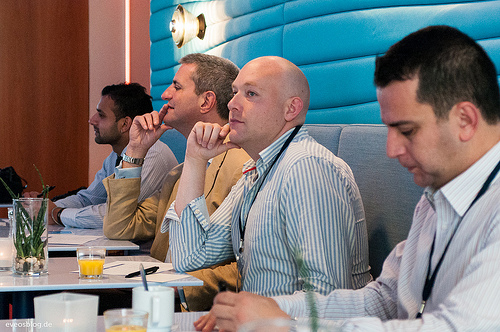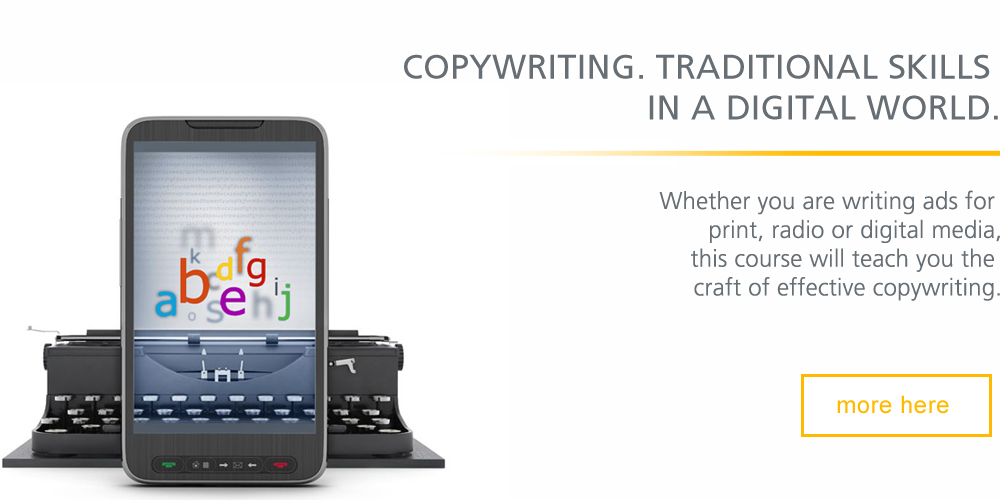For most of the twentieth century, television was the preferred channel for advertisers to promote their goods to the masses. A formula was created – the 30-second tv commercial, backed by press, poster and radio adverts.
But the advertising landscape has changed. There are now many more brands to choose from, a whole range of different broadcast channels and publications and, of course, technology that has completely shifted the way we communicate.
In this two-part article, copywriter MANDY SPEECHLY looks at the important changes in the advertising industry, and how to stay current.
Consumers are in charge
Consumers are now in control of the media they consume and how they consume it. As a result, advertisers need to adapt with the changing media environment and the habits of consumers. Copywriters need to explore options beyond traditional advertising.
In many ways, conventional advertising is becoming insufficient and predictable. But this does not mean traditional advertising will die. On the contrary, alternative forms of communication can provide fresh inspiration and take advertising to new levels of engagement and entertainment.
But it’s important to start in the right place.
The choice of media now becomes a creative decision and is as much a part of the communication as the actual writing. Advertising that is created in this way is more likely to demonstrate an understanding of the consumer’s lifestyle and his or her meeting point with the brand.
“It is not about matching luggage, it is more about an idea that is expressed in different ways which is true to an overriding theme.” Phil Dowgierd, Creative Director of Happen in London
How technology has changed the way we talk, share and advertise
Traditional advertising involves small interruptions which appear in between the content that people are already watching, reading or listening. Ad agencies created ads, media companies bought the space in which they appeared and the message was seen by an audience of predetermined size and demographics.
Current trends in advertising are showing a distinct shift away from this traditional “above-the-line” advertising approach and a move towards more integrated brand communications that are closer to the sale and often more accountable. New technology and attitudes to advertising are introducing novel ways of interacting and reaching your target market.
The Internet has revolutionised the way in which we find and consume information. It also provides the opportunity to measure the success of the communication at every step, and then make adaptations to ensure it works more effectively.
There has been much debate as to how devices like the PVR or TiVo (both brands of Pay on Demand TV) will be the death of the television commercial, as viewers can now avoid all advertising if they so choose. The reality is not as dire as these predictions, but there is no doubt it is time to abandon old approaches to advertising and start planning how to reach consumers in new and unexpected ways.
“The Internet has revolutionised the way in which we find and consume information. It also provides the opportunity to measure the success of the communication at every step, and then make adaptations to ensure it works more effectively.”
The arrival of Facebook, Twitter, YouTube and many other social media channels has altered the media landscape irrevocably. People of all demographics can now create and share opinions, videos, photos and any other information with more other people than ever before. Brands are now embedded into our lives quite spontaneously rather than being demarcated into a commercial slot in a predetermined way.
Advertising is not just about producing magazine adverts or radio and television commercials – it’s about communicating. There are many different and exciting ways of reaching a target market, and even more importantly, encouraging the right response to the message. Essentially the communication is all about building the brand, or selling a product and providing the right solution to a specific marketing problem.
READ MORE: *How Changing Technology Is Changing Advertising: Six Copywriting Trends For The New Year *SEO Copywriting: How To Use Keywords Effectively *Spotlight On Copywriting Tutor At The Writers’ College: Mandy Speechly
As a result of these changes, it is essential that advertisers find new forms of communication that are more noticeable, engaging and actively involve the consumer. The opportunities are boundless and continually evolving. Formalised channels do not always provide the best way of reaching people – a more effective message could maybe appear on a pizza box, a toilet roll or even a drain cover.
Our relationship with the media has changed from passive to active. As a result the consumer is harder to pin down, more demanding and less predictable.
The challenge is to think openly and constantly question if the chosen media is the best way to reach and persuade the target market.
“The real opportunity lies in exploiting the unique properties of digital in all its many variants to communicate in an entirely new way.” Patrick Burgoyne, Editor of Creative Review

About the Author:
Mandy Speechly has been working as a copywriter in the advertising industry for over fifteen years. She has worked full-time and as a freelancer for leading international advertising agencies on a range of different media including television, print, radio, brochures, promotions and websites.
Mandy is Head of Copy at the prestigious AAA School of Advertising in Cape Town where she works as the Graduate Copywriting Lecturer.
Mandy tutors the Copywriting Course at the Writers College. The course incorporates the latest copywriting skills required for the digital media and social media platforms, and suits both beginners to the field, as well as professional writers wishing to expand their copywriting skills. See the course curriculum and student feedback below.
Course feedback from graduate Copywriting students at The Writers College
“I really enjoyed this course, I felt like each module taught me valuable skills. There was no space wasted on filler content, so it really felt like a worthwhile course. I enjoyed working with Mandy, I felt that I could ask any questions, even if I felt they might be silly, and that she would take them seriously. She helped me to understand each module, and provided useful feedback. She even went the further mile and let me further edit projects that had already been marked, so that I could learn from any mistakes. The Writers’ College seems very professional in the way it runs courses, as well as in the quality of course it provides.” Samantha Dawe, Copywriting Course
“Mandy was always approachable and willing to offer friendly and professional advice. Her feedback on all assignments was clear, constructive and insightful.” Daryl Brown, Copywriting Course
“Overall, the course was a pleasurable and insightful experience. The notes really drew you in; you were never unsure where the module was going or what was needed from you. The worksheets got you thinking and allowed for creative thinking. Mandy was extremely encouraging, she is obviously a talented individual. She had excellent feedback on how to improve and better your ideas. I was very impressed at every level; from admin to notes to my tutor and to the understanding of the course coordinators.” Linda Jooste, The Copywriting Course
“Overall, I enjoyed the course structure and content. I liked that I could work at my own pace. Mandy was very thorough with her feedback, as well as being friendly and helpful. She offered some good advice and encouraged me, her attitude made me feel very motivated and confident with each module. It was a positive and challenging experience that has improved my knowledge and understanding of the industry.” Louise Bartlett, Copywriting Course
“I found [the course] very useful, entertaining, interesting and rewarding. Overall a very good introductory course and knowing that the lecturer would deal with submissions, comments and general feedback promptly and personally was a great help and encouragement. Mandy was encouraging but professional, very clear in her explanations, and great to deal with. I enjoyed the feeling that she was a professional in her field and didn’t pull punches regarding good and poorer work. Enjoyed the personal touch, and she conveys a true passion for her art.” Kevin Willemse, Copywriting Course
“I felt like I was learning from someone who is genuinely passionate about her subject. I have learned so much and am inspired to pursue it further.” Candice Nel, Copywriting Course
“The quality of the course I took was beyond what I ever expected and it was extremely worthwhile. I enjoyed working with Mandy and it was a brilliant course. The evaluations were excellent and always fair and justified. I appreciate the seriousness with which the course was handled and it made the process feel professional and worthwhile. The course was evaluated in a very rigorous and professional way, which I found quite intimidating at first, as I did not expect such an in-depth assessment per module. I loved this aspect but it should be noted up front that the course is demanding and not something to breeze through and expect good results; because I think many people would expect to ‘just get by’ – however, people who are serious about writing must be told this is a serious writing course. As those who are just looking to add something to their CV will get quite a shock once the course gets rolling. I really felt I got back what I put in and that is what made this a very worthwhile course.” Michael Rowlinson, Copywriting
“Thank you for the copywriting course. It was an excellent course. Getting work so quickly in the industry has been outstanding. I found Mandy to be an excellent lecturer. I especially valued her feedback and comments on my assignments” Greg Tosi, Copywriting Course
Photo credit: Eveos
















